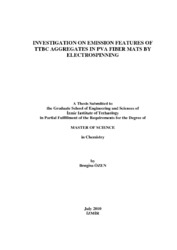Please use this identifier to cite or link to this item:
https://hdl.handle.net/11147/3043Full metadata record
| DC Field | Value | Language |
|---|---|---|
| dc.contributor.advisor | Demir, Mustafa Muammer | - |
| dc.contributor.author | Özen, Bengisu | - |
| dc.date.accessioned | 2014-07-22T13:50:46Z | - |
| dc.date.available | 2014-07-22T13:50:46Z | - |
| dc.date.issued | 2010 | - |
| dc.identifier.uri | http://hdl.handle.net/11147/3043 | - |
| dc.description | Thesis (Master)--İzmir Institute of Technology, Chemistry, İzmir, 2010 | en_US |
| dc.description | Includes bibliographical references (leaves: 40-43) | en_US |
| dc.description | Text in English; Abstract: Turkish and English | en_US |
| dc.description | xii, 43 leaves | en_US |
| dc.description.abstract | 1,1’,3,3’-tetraethyl-5,5’,6,6’ -tetrachlorobenzimidazolocarbocyanine (TTBC) is a frequently used cyanine dye that undergoes two different types of molecular aggregate (J and H-type). Dye molecules, in general, come into aggregation in ionic solutions and solid surfaces without control over the type and orientation of the resulting aggregate. In this research, we focused on electrospinning of aqueous poly(vinyl alcohol) (PVA)/TTBC solutions and investigated whether the aggregate formation could be controlled by solution and instrumental parameters of this process. Initially, TTBC was molecularly dispersed in aqueous PVA solution with a weight fraction of 0.001- 0.65 % and the precursor solution was subjected to electrospinning under electrical field ranging from 0.95-1.81 kV/cm. A stationary horizontal electrospinning set-up was used including two parallel-positioned metal strips as counter electrode. Both randomlydeposited and uniaxially aligned fibers were achieved. For the reason of comparison, reference films were prepared by spin-coating and film casting. Photoluminescence and polarized FTIR spectroscopy techniques were employed to examine spectral properties of the fibers. While H- and J-type aggregates coexist within spin-coated films and only J-aggregates exist within cast films, only H-type aggregates were observed within the fibers regardless of their alignment. A strong polarized emission was obtained from the unaxially aligned fibers due to the orientation of H-aggregates along the fibers. Consequently, electrospinning was found to be an alternative method to bring individually dispersed dye molecules into oriented H-type aggregates within submicron diameter fibers. Similar experimentation was also applied to TTBC/PS and Pyrene/Polystyrene(PS) systems to investigate aggregation behavior of dye molecules. TTBC exhibited similar behavior in PS/Dimethylformamide (DMF) system observed in PVA/H2O system. However, electrospinning has no remarkable influence on aggregation of pyrene in excimers. It slightly disassemble excimer structure. | en_US |
| dc.language.iso | en | en_US |
| dc.publisher | Izmir Institute of Technology | en_US |
| dc.rights | info:eu-repo/semantics/openAccess | en_US |
| dc.subject.lcsh | Dyes and dyeing--Textile fibers, Synthetic | en |
| dc.subject.lcsh | Electrospinning | en |
| dc.title | Investigation on Emission Features of Ttbc Aggregates in Pva Fiber Mats by Electrospinning | en_US |
| dc.type | Master Thesis | en_US |
| dc.institutionauthor | Özen, Bengisu | - |
| dc.department | Thesis (Master)--İzmir Institute of Technology, Chemistry | en_US |
| dc.relation.publicationcategory | Tez | en_US |
| dc.identifier.wosquality | N/A | - |
| dc.identifier.scopusquality | N/A | - |
| item.openairecristype | http://purl.org/coar/resource_type/c_18cf | - |
| item.languageiso639-1 | en | - |
| item.openairetype | Master Thesis | - |
| item.grantfulltext | open | - |
| item.fulltext | With Fulltext | - |
| item.cerifentitytype | Publications | - |
| Appears in Collections: | Master Degree / Yüksek Lisans Tezleri | |
Files in This Item:
| File | Description | Size | Format | |
|---|---|---|---|---|
| T000200.pdf | MasterThesis | 1.81 MB | Adobe PDF |  View/Open |
CORE Recommender
Page view(s)
180
checked on Mar 31, 2025
Download(s)
64
checked on Mar 31, 2025
Google ScholarTM
Check
Items in GCRIS Repository are protected by copyright, with all rights reserved, unless otherwise indicated.